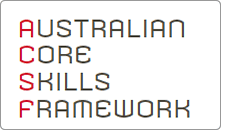 What is the ACSF?
What is the ACSF?
The Australian Core Skills Framework (ACSF) provides a rich, detailed picture of real life performance in the five core skills of:
- Learning
- Reading
- Writing
- Oral Communication
- Numeracy.
These skills are essential for individuals to participate effectively in our society. They are inextricably interwoven into all parts of our lives, being directly or indirectly linked to the physical, social and economic wellbeing of individuals, workplace productivity and safety, community interaction and capacity, and ultimately to Australia's economic and community wellbeing. The ACSF reflects contemporary use of English in Australia.
The ACSF has been developed to facilitate a consistent national approach to the identification and development of the core skills in diverse personal, community, work, and education and training contexts. It offers:
- shared concepts and language for identifying, describing and discussing core skills
- a systematic approach to benchmarking, monitoring and reporting on core skills performance.
Adult core skills development is lifelong because we are likely to require new or enhanced core skills each time we take on new roles and responsibilities or move into a new situation, or as a result of changes in the environment, including new technologies. Thus, any focus on improving core skills should not be confined to those with limited skills, but extend 'to all people trying to understand new forms of communication and information as they take on different roles in life and work.
To capture this, the ACSF describes performance in each of the core skills at five levels of performance along a continuum. It also acknowledges that the level of performance is not static either within or across core skills, but is influenced by the interplay of a range of variables, including the context within which the skills are applied. The inclusion of Learning as a core skill also reflects the dynamics of the ACSF and the critical importance of adopting strategies that help us adapt to changing circumstances and new challenges throughout our lives.
How can the ACSF be used?
Benchmarking an individual's core skills performance
The ACSF can be used to identify and describe an individual's performance in any of the core skills at a point in time. The Framework's specificity makes it possible to identify a person's areas of strength and need with some precision, so that training can be targeted to areas of need and an individual's progress monitored over time. The ACSF can also be used to develop core skills profiles of learner cohorts.
Mapping core skills requirements in education and training
The ACSF can be used to map the core skills requirements of any education and training course or unit in order to clarify and articulate core skills expectations, priorities and gaps. This facilitates the identification of similarities and differences between core skills requirements and expectations of performance within and across courses, disciplines and sectors.
A broad range of adult English language, literacy and numeracy (LLN) curricula have been mapped to the ACSF and it is also being used to identify, clarify and describe core skills requirements in national Training Package qualifications.
Tailoring approaches to teaching and learning
Following mapping of course requirements and materials, and identification of learner strengths and weaknesses, the ACSF can be used to:
- tailor curriculum, materials and methodologies to learner needs
- design and rate core skills assessment instruments
- evaluate the potential usefulness of assessment tasks by identifying the ACSF levels and Performance Features being assessed
- develop self evaluation tools which increase learner engagement and ownership
- assist teachers/trainers to provide specific feedback on performance.
Describing core skills relevant to the workplace and employment
The ACSF enables LLN practitioners to identify and discuss core skills issues with others in the workplace. This information helps human resources managers and workplace trainers, for example, when designing communication strategies and developing training for employees at any level of an organisation. It can also be used by specialist LLN practitioners to identify the core skill requirements of a job in order to provide appropriate support and training for someone moving into a new position.
The ACSF provides a framework that enables consistent descriptions of the five core skills in training programs tailored to workplace performance. Training Package developers can use the ACSF to ensure that the core skills associated with competency standards are articulated clearly and adequately addressed as part of unit design and descriptions. This in turn makes it easier for teachers/trainers to address core skills development as an integral part of training.
Implicatins for VET trainers
VET trainers and assessors are required to understand LLN issues in VET practice. In particular, trainers and assessors are required to:
- determine the core LLN requirements of training,
- access specialist learning support, and
- customise training to support the development of core LLN skills.




